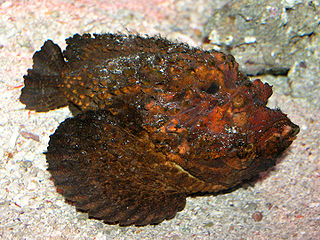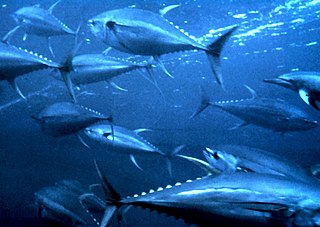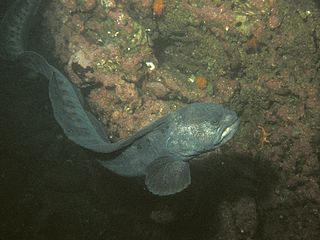
The Percidae are a family of ray-finned fish, part of the order Perciformes, which are found in fresh and brackish waters of the Northern Hemisphere. The majority are Nearctic, but there are also Palearctic species. The family contains more than 200 species in 11 genera. The perches, and their relatives are in this family; well-known species include the walleye, sauger, ruffe, and three species of perch. However, small fish known as darters are also a part of this family.

The Squaliformes are an order of sharks that includes about 126 species in seven families.

The electric rays are a group of rays, flattened cartilaginous fish with enlarged pectoral fins, composing the order Torpediniformes. They are known for being capable of producing an electric discharge, ranging from 8 to 220 volts, depending on species, used to stun prey and for defense. There are 69 species in four families.

Synanceiinae is a subfamily of venomous ray-finned fishes, waspfishes, which is classified as part of the family Scorpaenidae, the scorpionfishes and their relatives. These fishes are found in the Indo-Pacific oceans. They are primarily marine, though some species are known to live in fresh or brackish waters. The various species of this family are known informally as stonefish, stinger, stingfish and ghouls. Its species are known to have the most potent neurotoxins of all the fish venoms, secreted from glands at the base of their needle-like dorsal fin spines. The vernacular name, stonefish, for some of these fishes derives from their behaviour of camouflaging as rocks. The type species of the family is the estuarine stonefish.

Echinorhinus is the only extant genus in the family Echinorhinidae.

Pholidae is a family of marine ray-finned fishes, known as gunnels, in the Scorpaeniform suborder Zoarcoidei. These are fishes of the littoral zone and are mainly found in North Pacific Ocean, with two species found in the North Atlantic Ocean and Arctic Ocean.

Stichaeidae, the pricklebacks or shannies, are a family of marine ray-finned fishes in the suborder Zoarcoidei of the order Scorpaeniformes. Most species are found in the North Pacific Ocean with a few in the North Atlantic Ocean.

Parapterois is a genus of marine ray-finned fishes belonging to the family Scorpaenidae, the scorpionfishes. These fish originate from marine environments in the Indian Ocean or near it. The venomous Parapterois heterura is occasionally seen as an aquarium fish.

The Platycephalidae are a family of marine fish, most commonly referred to as flatheads. They are relatives of the popular lionfish, belonging to the order Scorpaeniformes.

Platycephalus is a genus of mostly marine, demersal ray-finned fish belonging to the family Platycephalidae. They are found in the eastern Mediterranean, the Indian Ocean and western Pacific Ocean.

Thunnus is a genus of ocean-dwelling, ray-finned bony fish from the mackerel family, Scombridae. More specifically, Thunnus is one of five genera which make up the tribe Thunnini – a tribe that is collectively known as the tunas. Also called the true tunas or real tunas, Thunnus consists of eight species of tuna, divided into two subgenera. The word Thunnus is the Middle Latin form of the Greek thýnnos – which is in turn derived from thynō. The first written use of the word was by Homer.

The tentacled flathead, also known as the Indian Ocean crocodilefish, Madagascar flathead or longhead flathead, is a species of marine ray-finned fish belonging to the family Platycephalidae, the flatheads. This species is in the western Indian Ocean, including the Red Sea and the Mediterranean, having invaded as a Lessepsian migrant through the Suez Canal. It is the only species in the monotypic genus Papilloculiceps.

The wolf eel is a species of marine ray-finned fish belonging to the family Anarhichadidae, the wolf fishes. It is found in the North Pacific Ocean. Despite its common name and resemblance, it is not a true eel. It is the only species in the monotypic genus Anarrhichthys.

Gymnocephalus is a genus of ray-finned fishes from the family Percidae, which includes the perches, pike-perches and darters. They are from the Western Palearctic area, although one species, Gymnocephalus cernua has been accidentally introduced to the Great Lakes region where it is regarded as an invasive species. They have the common name "ruffe" and resemble the true perches in the genus Perca, but are usually smaller and have a different pattern.

Tetraroginae is a subfamily of marine ray-finned fishes, commonly known as waspfishes or sailback scorpionfishes, belonging to the family Scorpaenidae, the scorpionfishes and their relatives. These fishes are native to the Indian Ocean and the West Pacific. As their name suggests, waspfishes are often venomous; having poison glands on their spines. They are bottom-dwelling fish, living at depths to 300 metres (980 ft). These creatures usually live in hiding places on the sea bottom.

Synanceia is a genus of ray-finned fish belonging to the subfamily Synanceiinae, the stonefishes, which is classified within the family Scorpaenidae, the scorpionfishes and relatives. Stonefishes are venomous, dangerous, and fatal to humans. They are the most venomous fish known. They are found in the coastal regions of the Indo-Pacific.

Bellator is a genus of marine ray-finned fishes belonging to the family Triglidae, one of two genera belonging to the subfamily Prionotinae, the sea robins. These fishes are found in the Western Atlantic Ocean and eastern Pacific Ocean, in the waters off both North and South America.

Pterygotrigla is a genus of genus of marine ray-finned fishes belonging to the family Triglidae, the gurnards and sea robins, one of two genera belonging to the subfamily Pterygotriglinae. These gurnards are found in the Indian and Pacific oceans.

The streaked gurnard, also known as the African gurnard or rock gurnard, is a species of ray-finned fish belonging to the family Triglidae, the gurnards and sea robins. This fish is found in the eastern Atlantic Ocean and western Indian Ocean. This species is of commercial importance as a food fish.

Pterygotrigla polyommata, the latchet, butterfly gurnard, flying gurnard, lachet gurnard, pastry, sharpbeak gurnard, spiny gurnard or spinybeak gurnard, is a species of marine ray-finned fish belonging to the family Triglidae, the gurnards and sea robins. It is found in the southeastern Indian and southwestern Pacific Oceans.


















